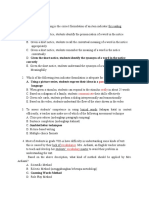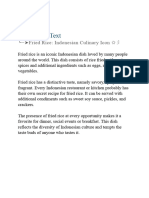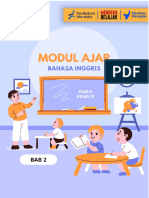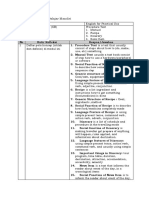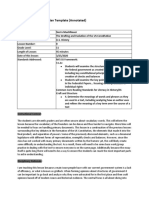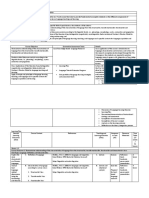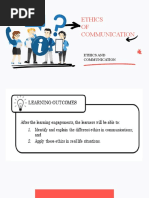Should Schools Relax Cell Phone Policies?
Should Schools Relax Cell Phone Policies?
Uploaded by
Joanna Jamaima R. FerriolCopyright:
Available Formats
Should Schools Relax Cell Phone Policies?
Should Schools Relax Cell Phone Policies?
Uploaded by
Joanna Jamaima R. FerriolOriginal Title
Copyright
Available Formats
Share this document
Did you find this document useful?
Is this content inappropriate?
Copyright:
Available Formats
Should Schools Relax Cell Phone Policies?
Should Schools Relax Cell Phone Policies?
Uploaded by
Joanna Jamaima R. FerriolCopyright:
Available Formats
News Debate: Cell Phone Scramble
News Debate: Cell Phone Scramble
Should schools relax cell phone policies?
More kids than ever carry cell phones these days, and schools are making tough calls when it comes
to regulating the devices.
Randy Faris/Corbis
Some schools have relaxed their mobile technology policies. New Manchester High School in
Douglasville, Ga., is one of several schools that launched "bring your own technology" programs this
year. Students at that school are encouraged to bring their own smart phones, electronic tablets, and
other Internet-enabled devices to class, and teachers are incorporating them into lessons. Using
personal devices to enhance education has many fans.
Many schools, however, are cracking down on cell phone use by students. Freeport High School in
Portland, Maine, for example, strengthened its anti-cell phone policy for the 2011-2012 school year.
The school, which used to allow students to use cell phones during lunch, now requires students to
turn off cell phones during school hours. Supporters of such cell phone restrictions argue that the
devices distract students from learning and provide more opportunities for kids to cheat.
Is it time schools relax their cell phone hang-ups? Current Events student reporters Peter Brosnan
and Akash Bagaria each dialed up a side.
Smart Phones, Smart Kids
Cell phones might be smarter for the classroom than you think! Schools should allow students to
carry cell phones because, if managed properly, the phones can enhance learning and become
valuable teaching tools, while keeping students safe and in contact with their parents.
ReadWorks.org · © 2017 ReadWorks®, Inc. All rights reserved.
Copyright © 2009 Weekly Reader Corporation. All rights reserved. Used by permission.Weekly Reader is a registered trademark of Weekly Reader Corporation.
News Debate: Cell Phone Scramble
First, many students are excited to use cell phone technology. If schools incorporate that technology
into lessons, students will become more excited about their classes.
As cell phones become more like mini laptop computers, they can be very useful in the classroom.
For example, students can use cell phone technology to access online books, newspaper articles,
and other materials. When you focus on the positive uses of cell phone technology, the possibilities
are endless!
Finally, many parents and students rely on cell phones to keep in touch in case plans change after
school. Grace Hurley, 13, an eighth grader from Yorktown Heights, N.Y., agrees. "We should be able
to carry our cell phones in school because we may need to contact our parents in emergencies," she
says.
No Cell Before The Bell!
Schools should ban students from carrying cell phones during classes. Cell phones can be a major
distraction and impair student learning. Cell phones also give students more opportunities to cheat
and cyberbully.
Kids can use cell phones to take pictures, chat, surf the Web, and listen to music. Those features can
distract students during the school day. According to a 2010 study by the Pew Research Center, 64
percent of teens with cell phones have sent texts during class. Those texts are most likely distracting
kids from their studies. Steven Hancock, an administrator at Princeton Day School, agrees. He says,
"Cell phones have addictive qualities that will impede student engagement and learning."
In addition, cell phones allow students to cheat during exams. Students can text friends or find
answers on the Internet, for example.
Finally, cell phones in class may lead to cyberbullying. Sadly, students may use phones to take
photos of other kids doing something awkward and text the pictures to friends. Gossip spreads like
wildfire, after all.
ReadWorks.org · © 2017 ReadWorks®, Inc. All rights reserved.
Copyright © 2009 Weekly Reader Corporation. All rights reserved. Used by permission.Weekly Reader is a registered trademark of Weekly Reader Corporation.
ReadWorks Vocabulary - restriction
restriction re · stric · tion
Advanced Definition
noun
1. something that limits or confines.
Their parents were stern and rigid, and the children had many restrictions.
The government is placing new restrictions on immigration.
2. the act of restricting or condition of being restricted.
The restriction of imports will take place next month.
He regretted his marriage and saw it as nothing but restriction.
Spanish cognate
restricción: The Spanish word restricción means restriction.
These are some examples of how the word or forms of the word are used:
1. High schools should not place restrictions on military recruiters. That would promote negativity
toward the military and discourage students from enlisting in the armed forces. Schools should
welcome military recruiters honorably, not keep them away.
2. The school, which used to allow students to use cell phones during lunch, now requires
students to turn off cell phones during school hours. Supporters of such cell phone restrictions
argue that the devices distract students from learning and provide more opportunities for kids
to cheat.
ReadWorks.org · © 2017 ReadWorks®, Inc. All rights reserved.
Definitions and sample sentences within definitions are provided by Wordsmyth. © 2015 Wordsmyth. All rights reserved.
News Debate: Cell Phone Scramble - Comprehension Questions
Name: ___________________________________ Date: _______________
1. According to the passage, what is the mobile technology policy at Freeport High
School in Portland, Maine?
A. Students are allowed to use electronic tablets but not smart phones.
B. Students are not allowed to bring mobile technology into the school.
C. Students are encouraged to bring their own smart phones to class.
D. Students are required to turn off cell phones during school hours.
2. The passage shows two sides of this debate: Should schools relax cell phone
policies? According to the passage, what is one argument AGAINST relaxing cell phone
policies?
A. Cell phones may help reduce cyberbullying problems.
B. Most teens with cell phones don't send texts during class.
C. Cell phones allow students to cheat during exams.
D. Students rely on cell phones to keep in touch with parents.
3. What can you most likely conclude after reading the passage?
A. People have mixed opinions about the use of cell phones in school.
B. Schools that ban cell phones provide more opportunities for learning.
C. If schools relax their cell phone policies, more teachers will start texting.
D. Most students agree with the policy to ban cell phones from school.
4. Read this sentence from the passage:
"If schools incorporate that technology into lessons, students will become more excited
about their classes."
In this sentence, the word incorporate means
A. to eliminate
B. to blend
C. to improve
D. to study
ReadWorks.org · © 2017 ReadWorks®, Inc. All rights reserved.
News Debate: Cell Phone Scramble - Comprehension Questions
5. The primary purpose of this passage is to
A. describe how personal technology devices enhance education
B. present both sides of a debate about school cell phone policies
C. explain why New Manchester High School relaxed its cell phone policy
D. persuade high school students to stop using cell phones at school
6. How many students have sent texts during class according to the 2010 study by the
Pew Research Center?
7. How would Steven Hancock, an administrator at Princeton Day, most likely feel if his
school relaxed its cell phone policy? How do you know? Please provide evidence from
the text.
8. The question below is an incomplete sentence. Choose the word that best completes
the sentence.
_______ more kids than ever carry cell phones these days, schools have to make some
tough decisions about mobile technology policies.
A. Because
B. But
C. Otherwise
D. First
9. Vocabulary Word: regulate: to bring under the control of authority.
Use the vocabulary word in a sentence:
Answers will vary.
ReadWorks.org · © 2017 ReadWorks®, Inc. All rights reserved.
News Debate: Cell Phone Scramble - Comprehension Questions Answer Key
1. According to the passage, what is the mobile technology policy at Freeport High
School in Portland, Maine?
A. Students are allowed to use electronic tablets but not smart phones.
B. Students are not allowed to bring mobile technology into the school.
C. Students are encouraged to bring their own smart phones to class.
D. Students are required to turn off cell phones during school hours.
2. The passage shows two sides of this debate: Should schools relax cell phone
policies? According to the passage, what is one argument AGAINST relaxing cell phone
policies?
A. Cell phones may help reduce cyberbullying problems.
B. Most teens with cell phones don't send texts during class.
C. Cell phones allow students to cheat during exams.
D. Students rely on cell phones to keep in touch with parents.
3. What can you most likely conclude after reading the passage?
A. People have mixed opinions about the use of cell phones in school.
B. Schools that ban cell phones provide more opportunities for learning.
C. If schools relax their cell phone policies, more teachers will start texting.
D. Most students agree with the policy to ban cell phones from school.
4. Read this sentence from the passage:
"If schools incorporate that technology into lessons, students will become more excited
about their classes."
In this sentence, the word incorporate means
A. to eliminate
B. to blend
C. to improve
D. to study
ReadWorks.org · © 2017 ReadWorks®, Inc. All rights reserved.
News Debate: Cell Phone Scramble - Comprehension Questions Answer Key
5. The primary purpose of this passage is to
A. describe how personal technology devices enhance education
B. present both sides of a debate about school cell phone policies
C. explain why New Manchester High School relaxed its cell phone policy
D. persuade high school students to stop using cell phones at school
6. How many students have sent texts during class according to the 2010 study by the
Pew Research Center?
According to the study, 64 percent of teens with cell phones have sent
texts during class. [paragraph 2 after subhead "No Cell Before the Bell!"]
7. How would Steven Hancock, an administrator at Princeton Day, most likely feel if his
school relaxed its cell phone policy? How do you know? Please provide evidence from
the text.
He would most likely be unhappy since he thinks cell phones have
"addictive qualities that will impede student engagement and learning."
[paragraph 2 after subhead "No Cell Before the Bell!"]
8. The question below is an incomplete sentence. Choose the word that best completes
the sentence.
_______ more kids than ever carry cell phones these days, schools have to make some
tough decisions about mobile technology policies.
A. Because
B. But
C. Otherwise
D. First
9. Vocabulary Word: regulate: to bring under the control of authority.
Use the vocabulary word in a sentence:
Answers will vary.
ReadWorks.org · © 2017 ReadWorks®, Inc. All rights reserved.
You might also like
- KD 3.1 LKPD SelamatDocument6 pagesKD 3.1 LKPD SelamatWahyou Juztyn100% (1)
- 8-9 Inem StoryDocument9 pages8-9 Inem StoryJoanna Jamaima R. Ferriol100% (4)
- 165 Irregular Verbs WithFrenchDocument4 pages165 Irregular Verbs WithFrenchFayzaBouchoul100% (1)
- Conversational French. BiermanDocument343 pagesConversational French. Biermannousos100% (1)
- Modul Ajar Adiwiyata Kelas Viii - Bahasa Inggris - Kebersihan (Ajakan) - Muhammad Rukhan AsroriDocument32 pagesModul Ajar Adiwiyata Kelas Viii - Bahasa Inggris - Kebersihan (Ajakan) - Muhammad Rukhan AsroriMohamad Saikhul Arif100% (1)
- RPP Bhs. Inggris Kelas XIDocument32 pagesRPP Bhs. Inggris Kelas XISy 'Sylva Sari' Cucoerhammanie80% (5)
- Student Worksheet Advertising Unit Student Meterial A. Examples of Advertisement TextDocument4 pagesStudent Worksheet Advertising Unit Student Meterial A. Examples of Advertisement TextAisyah RevolusionerNo ratings yet
- Soal Psaj Eng FixDocument11 pagesSoal Psaj Eng FixPrima Alexandra MuhajirNo ratings yet
- Soal Um Kelas 9 2021-2022Document12 pagesSoal Um Kelas 9 2021-2022MSol Abu KhansaNo ratings yet
- LKPD 10 Kelas 8Document2 pagesLKPD 10 Kelas 8Melly Saftriani100% (1)
- LKPD Kelas 7 Bahasa Inggris - Telling The DatesDocument2 pagesLKPD Kelas 7 Bahasa Inggris - Telling The DatesTANNo ratings yet
- Soal Uts Kls 9Document7 pagesSoal Uts Kls 9Anisah QubaelaNo ratings yet
- Kartu Soal Uas Bahasa Inggris Kelas XiiDocument14 pagesKartu Soal Uas Bahasa Inggris Kelas XiiNaufal Afif ZNo ratings yet
- Ulangan Harian Bab 3Document4 pagesUlangan Harian Bab 3Anniza WinandaryNo ratings yet
- RPP SUPERVISI My Study HabitDocument2 pagesRPP SUPERVISI My Study HabitMETSI VEMMY TUMEWUNo ratings yet
- LKPD Bing ViiiDocument22 pagesLKPD Bing ViiiNilma Husni RaihraNo ratings yet
- Showing ApreciationDocument2 pagesShowing ApreciationNeni Chandra0% (1)
- Modul Ajar Adiwiyata Kelas VIII - Bahasa Inggris - Inovasi - Eka Reski Fauziah - English VerDocument20 pagesModul Ajar Adiwiyata Kelas VIII - Bahasa Inggris - Inovasi - Eka Reski Fauziah - English VerMohamad Saikhul Arif100% (2)
- Soal Latihan Bahasa Inggris Asking and Giving Fact Kelas 7Document1 pageSoal Latihan Bahasa Inggris Asking and Giving Fact Kelas 7Riska Arisna100% (1)
- Modul Kelas 8Document26 pagesModul Kelas 8Dessy Kusumawati IINo ratings yet
- Instrumen PenilaianDocument2 pagesInstrumen PenilaianTriNo ratings yet
- LKPD Bahasa Inggris Kelas ViiDocument17 pagesLKPD Bahasa Inggris Kelas ViiNurlaila 1234No ratings yet
- Kartu Soal B Ig 9, Genap TH 2017Document26 pagesKartu Soal B Ig 9, Genap TH 2017lilik masrukhahNo ratings yet
- Soal Uts Bahasa Inggris Kelas 7Document5 pagesSoal Uts Bahasa Inggris Kelas 7Nyimas Nurqomariah100% (1)
- PHB Sastra Inggris Kelas Xii IpsDocument6 pagesPHB Sastra Inggris Kelas Xii IpsAmirul Madjid ibrahimNo ratings yet
- STUDENT OBSERVATION SHEET PBLDocument2 pagesSTUDENT OBSERVATION SHEET PBLLichaNo ratings yet
- LKPD 1 Kelas 7 MGG 2Document1 pageLKPD 1 Kelas 7 MGG 2CintaD.AndiniNo ratings yet
- Soal Up 12-12-21Document29 pagesSoal Up 12-12-21Lia Purnama Sari100% (1)
- LKPD (Repaired)Document18 pagesLKPD (Repaired)Masri Manas100% (3)
- Chapter 1 Good Morning How Are YouDocument5 pagesChapter 1 Good Morning How Are YouYandi HerdiyantoNo ratings yet
- Set 3 Soal Uji Pengetahuan PPGDocument18 pagesSet 3 Soal Uji Pengetahuan PPGZinlong BejatNo ratings yet
- Checklist PBL 2Document3 pagesChecklist PBL 2Hazrina Awang100% (1)
- LK 1 - Profesional English For Public InformationDocument4 pagesLK 1 - Profesional English For Public InformationAnto Buddy100% (1)
- Soal Pedagogik PPG Angkatan 4-1Document7 pagesSoal Pedagogik PPG Angkatan 4-1Herida Yani100% (1)
- Exam Adiba - SOAL Materi Ordering Foods, Animals, Introduction, Time CalendarDocument4 pagesExam Adiba - SOAL Materi Ordering Foods, Animals, Introduction, Time CalendarAhmad KemalNo ratings yet
- LKPD Asking and Giving 2Document2 pagesLKPD Asking and Giving 2Lisya Rivianti ZikraNo ratings yet
- RPP Recount Listening MonologDocument5 pagesRPP Recount Listening MonologDevosh Van HölleNo ratings yet
- Sempro AlfiDocument20 pagesSempro AlfiNazar BroNo ratings yet
- Descriptive Text: Fried Rice: Indonesian Culinary Icon ╰┈➤ ✩彡Document1 pageDescriptive Text: Fried Rice: Indonesian Culinary Icon ╰┈➤ ✩彡Vivian NelissaNo ratings yet
- LKPD by IrwanDocument3 pagesLKPD by IrwanIrwan Wan100% (3)
- Greeting CardsDocument6 pagesGreeting CardsHari SusantoNo ratings yet
- Worksheet 1 Kelas IX Bahasa InggrisDocument1 pageWorksheet 1 Kelas IX Bahasa InggrissatapNo ratings yet
- English On Sky 9Document17 pagesEnglish On Sky 9csmodul69No ratings yet
- Tugas Soal Bahasa InggrisDocument7 pagesTugas Soal Bahasa InggrisMinmiee Merry Yelloicy CathabellNo ratings yet
- Penilaian Harian Bahasa Inggris Kelas 1Document2 pagesPenilaian Harian Bahasa Inggris Kelas 1Yusak Budi SantosoNo ratings yet
- Milk Calcium Dietary Supplement 600 MG 100 Soft GelsDocument2 pagesMilk Calcium Dietary Supplement 600 MG 100 Soft GelsZhanny Sun100% (1)
- Soal Latihan Bahasa Inggris Asking For RepetitionDocument2 pagesSoal Latihan Bahasa Inggris Asking For RepetitionFaizal Hasan RamadhaniNo ratings yet
- LK 1: Lembar Kerja Belajar MandiriDocument2 pagesLK 1: Lembar Kerja Belajar MandiriArga Dwi AfandiNo ratings yet
- Modul 2 Peta KonsepDocument6 pagesModul 2 Peta KonsepGracenawatiNo ratings yet
- Soal Pilihan GandaDocument12 pagesSoal Pilihan GandaAmdi Zulhefi100% (1)
- Proceeding 2nd UNJ ICTVET 2015 Vol 3Document67 pagesProceeding 2nd UNJ ICTVET 2015 Vol 3Aeris ReyhaNo ratings yet
- Sample Page - Rise Up - Student Book 5-MinDocument30 pagesSample Page - Rise Up - Student Book 5-Minheru.mentarigroupNo ratings yet
- Modul Ajar Kelas 8 Can WillDocument37 pagesModul Ajar Kelas 8 Can WillRahma ReunzNo ratings yet
- Map and Giving Direction Workseheet Pkgbi Section 4Document2 pagesMap and Giving Direction Workseheet Pkgbi Section 4rahayu.nur884100% (1)
- SOAL Greeting Card KL 8Document1 pageSOAL Greeting Card KL 8Budi PramonoNo ratings yet
- Worksheet Chapter IV Kelas 7 PDFDocument1 pageWorksheet Chapter IV Kelas 7 PDFnelitaNo ratings yet
- Skripsi Bu Nasriah Bab 1-5Document55 pagesSkripsi Bu Nasriah Bab 1-5Dbs Abdul HadiNo ratings yet
- Soal PAS B.INGG 9 NewDocument4 pagesSoal PAS B.INGG 9 Newabdul wahabNo ratings yet
- Tugas 2 Pbis4202Document4 pagesTugas 2 Pbis4202Badrus Sani100% (1)
- Grade 11 - Passage-Based Argumentative Writing AssessmentDocument3 pagesGrade 11 - Passage-Based Argumentative Writing AssessmentCourier JournalNo ratings yet
- DokumewDocument6 pagesDokumewSyaza SabrinaNo ratings yet
- Cell Phones in School Thesis StatementDocument8 pagesCell Phones in School Thesis Statementtunwpmzcf100% (1)
- Thesis On Cell Phone Use in SchoolDocument8 pagesThesis On Cell Phone Use in Schooldebbiebeasonerie100% (2)
- Elements of A Story GroupworkDocument1 pageElements of A Story GroupworkJoanna Jamaima R. FerriolNo ratings yet
- 6-7 Individual Writing PracticeDocument3 pages6-7 Individual Writing PracticeJoanna Jamaima R. FerriolNo ratings yet
- African American FeminismDocument49 pagesAfrican American FeminismJoanna Jamaima R. FerriolNo ratings yet
- Mock Trial RubricsDocument3 pagesMock Trial RubricsJoanna Jamaima R. Ferriol100% (1)
- Week 5 Grade 8 Term 3Document4 pagesWeek 5 Grade 8 Term 3Joanna Jamaima R. FerriolNo ratings yet
- The Screenplay - A Genre AnalysisDocument7 pagesThe Screenplay - A Genre Analysisapi-242127156No ratings yet
- XI Seen Grammar Exercise and Solution TopicwiseDocument13 pagesXI Seen Grammar Exercise and Solution TopicwiseTanisha ShahNo ratings yet
- Grade 12 Spelling BeeDocument1 pageGrade 12 Spelling BeeRuqaia NajmNo ratings yet
- βροντή - Wiktionary, the free dictionaryDocument3 pagesβροντή - Wiktionary, the free dictionaryIgor HrsticNo ratings yet
- Explicit Vs ImplicitDocument2 pagesExplicit Vs ImplicitIrish NicoleNo ratings yet
- Common Adverb and Adjective CollocationsDocument9 pagesCommon Adverb and Adjective Collocationsmonabona66No ratings yet
- American PoemsDocument54 pagesAmerican Poemsr9 LS77No ratings yet
- The Effectiveness Between Filipino and English On Developing Writing Skills Prac 2 BOSDocument3 pagesThe Effectiveness Between Filipino and English On Developing Writing Skills Prac 2 BOSYseea OrpillaNo ratings yet
- Static GK Hindi Medium 2nd Edition by Godfather Join @Apna PDFDocument249 pagesStatic GK Hindi Medium 2nd Edition by Godfather Join @Apna PDFYdv DeepakNo ratings yet
- Important Questions Asked in InterviewsDocument55 pagesImportant Questions Asked in InterviewsvikramshanuNo ratings yet
- 10 1111 02 4RP AFP tcm143-671171Document8 pages10 1111 02 4RP AFP tcm143-671171PriyarulNo ratings yet
- Noticing Hypothesis LectureDocument13 pagesNoticing Hypothesis LecturegpsilverNo ratings yet
- Basic English and Grammatical Reform, 1937, C.K. OgdenDocument25 pagesBasic English and Grammatical Reform, 1937, C.K. OgdenArslankhan83100% (1)
- Grammar MCQSDocument21 pagesGrammar MCQSikram7550No ratings yet
- Common SOE Lesson Plan Template (Annotated) As of September 2019Document6 pagesCommon SOE Lesson Plan Template (Annotated) As of September 2019api-549459542No ratings yet
- Intro To Linguistics SyllabusDocument7 pagesIntro To Linguistics SyllabusNikkiItliong100% (2)
- Word Formation ProcessesDocument1 pageWord Formation ProcessesNoel Krish ZacalNo ratings yet
- CMR University School of Engineering and Technology Department of Cse and ItDocument8 pagesCMR University School of Engineering and Technology Department of Cse and ItSmart WorkNo ratings yet
- The Black RavenDocument17 pagesThe Black RavenSuhani RohraNo ratings yet
- Paperback Adventures RulebookDocument24 pagesPaperback Adventures RulebookEric OverkampNo ratings yet
- The Portrayal of Homosexuality and QueerDocument12 pagesThe Portrayal of Homosexuality and Queerhanlewen2No ratings yet
- Relevance of The Knowledge of Foreign Languages As An Instrument of Communication Among People and CountriesDocument8 pagesRelevance of The Knowledge of Foreign Languages As An Instrument of Communication Among People and CountriesMvp LoloNo ratings yet
- Thesis Proposal in English TeachingDocument7 pagesThesis Proposal in English Teachingbk156rhq100% (2)
- Social Studies Class 7 Learning About The PastDocument4 pagesSocial Studies Class 7 Learning About The Pastapi-535552931No ratings yet
- Low Tech Communication & Classroom DisplayDocument6 pagesLow Tech Communication & Classroom DisplayMarinda RaubenheimerNo ratings yet
- Ethics of CommunicationDocument23 pagesEthics of CommunicationWinter BacalsoNo ratings yet
- CS 540-1: Introduction To Artificial Intelligence: Exam 2: 7:15-9:15pm, November 20, 1995Document8 pagesCS 540-1: Introduction To Artificial Intelligence: Exam 2: 7:15-9:15pm, November 20, 1995chemchemhaNo ratings yet
- Significado Forma Simple Pasado Participio Pdo. /ed/: Regular VerbsDocument4 pagesSignificado Forma Simple Pasado Participio Pdo. /ed/: Regular VerbsGabriela SalcedoNo ratings yet

































